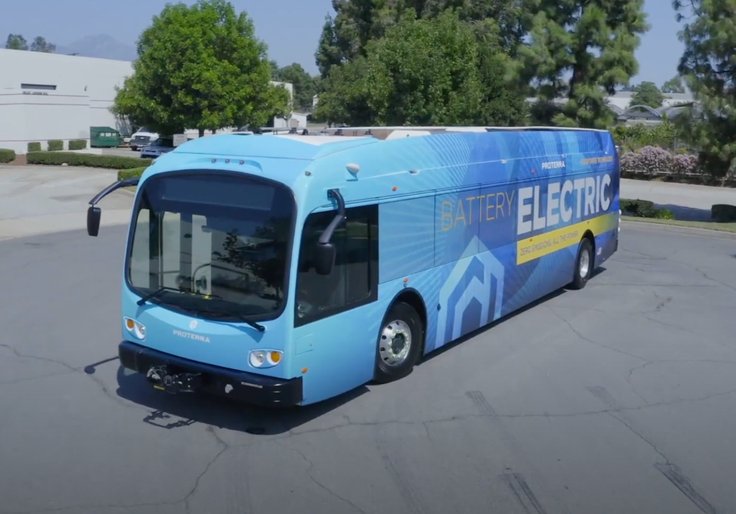Electric bus manufacturer Proterra showcased the billions of dollars the infrastructure bill sends to its industry to shareholders during its first earnings call as a publicly traded company.
The politically connected battery company, which as recently as this May counted Energy Secretary Jennifer Granholm as one of its largest investors, told shareholders on Wednesday that it plans to "ride the wave" of government spending in the electric vehicle sector. The company pointed to up to $5 billion set aside in the bill for new electric school buses, and an additional $4 billion for the Low or No Emission Vehicle Program, which funds the purchase of electric transit vehicles for local governments, which Proterra has benefited from for years.
"There’s a lot in there that’s positive for electrifying the United States," company executives told shareholders on the Wednesday earnings call. In a company report provided to investors, Proterra boasted that it has positioned itself to "play a central role in the electrification" of commercial vehicles across the country.
"The tailwinds to the North American electric transit bus market have never been stronger," the company report states. "With zero emission transit bus funding increasing by over 300 percent over 2021 funding levels, we expect the Act, if passed by Congress and signed into law, to help drive significant acceleration in the electrification of the more than 65,000 buses in the North American transit bus fleet."
Proterra’s first earnings call since becoming a publicly traded company in June fortuitously came just days after the infrastructure bill was approved by the Senate. The Biden administration has signaled for months that Proterra would benefit from the spending proposal, but the details weren’t revealed until this week.
The company has received praise from the highest echelons of the Biden administration, and that continued on Wednesday. Just hours before Proterra’s earnings call, it scored a valuable shoutout from its most prominent supporter—President Joe Biden, who called the company’s work "phenomenal" while promoting the infrastructure package.
"I was in Carolina looking at a factory where they’re making not only school buses but also regular transit systems that are electric-based," the president said in reference to his April tour of a Proterra facility. "It’s phenomenal what’s going on."
The government praise has not buoyed Proterra’s stock, which has fallen roughly 30 percent in the past two months as reports emerge about technological problems in its electric buses. In Philadelphia, the fleet of Proterra transit buses was taken off the road due to mechanical problems and poor performance of the trademark batteries. In Southern California, one of Proterra’s earliest government partners is considering early retirement for its Proterra buses after one bus lit on fire.
When asked by investors on the earnings call about these problems, Proterra executives were dismissive. An executive called the problems plaguing Proterra’s Philadelphia fleet "cosmetic" and blamed a hostile media for covering its failures in California.
It remains unclear how much of the billions of dollars set aside for Proterra’s industry will end up in the company’s hands. The infrastructure bill allocates up to $5 billion to purchasing new emissions-free school buses, an industry Proterra dominates. Electric school buses can reportedly cost up to $400,000, meaning the investment could pay for roughly 12,500 buses—a small fraction of the estimated 500,000 school buses used across the United States, according to the American School Bus Council.
The company is also well-positioned to reap the rewards of the $4 billion in funding for the low or No Emission Vehicle Program, which makes federal funds available to local and state governments that want to buy electric vehicles. In investor materials, Proterra says it controls 50 percent of the market for eligible electric battery-powered transit vehicles.
This calculation doesn’t factor in that Proterra buses have been plagued by high-profile delays in arrival. La Crosse, Wis., which used federal grants to buy two Proterra buses in 2018, for example, has yet to receive them three years later. On the investor call, Proterra executives dismissed concerns about a bus backlog, saying they prefer to focus on the buses that have actually arrived.
Proterra did not respond to a request for comment.
